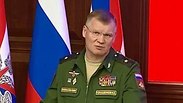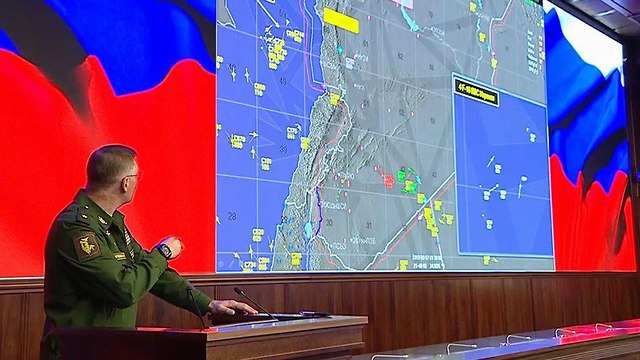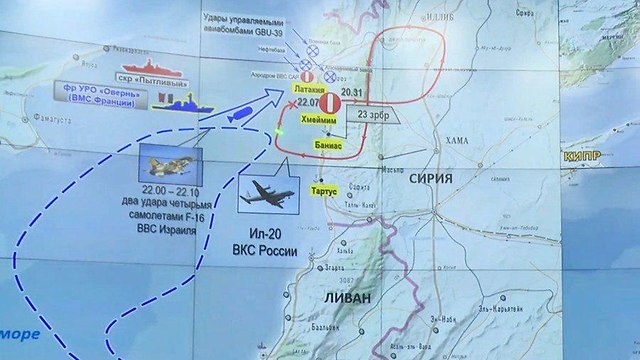

Despite Israeli version, Kremlin blames IAF for plane downing
In Moscow press briefing, Russian Defense Ministry spokesman presents country's findings on Syria's downing of Russian reconnaissance plane during attempt to repel IAF strike on Latakia; 'F-16 pilots used a Russian aircraft as a shield against the Syrian air defenses.'
The Russian Defense Ministry announced on Sunday that Israel bears responsibility for the Syrian downing of a Russian reconnaissance plane during an Israel Air Force (IAF) strike last week.
The Defense Ministry presented the findings of its investigation into the incident and according to Russia Today (RT), the ministry holds Israel responsible for the downing of the Ilyushin IL-20 plane that killed 15 people on board.
According to the report, the IAF deceived the Russians by presenting false information regarding the area in which the strike in Latakia was planned on September 17 which prevented the Russian plane from leaving the danger zone.
For several years, Israel and Russia have maintained a special hotline to prevent their air forces from clashing in the skies over Syria. Russia has provided key air support to President Bashar Assad's forces since 2015, while Israel has carried out dozens of strikes against Iran-linked forces. Israeli military officials have previously praised the hotline's effectiveness.
But ministry spokesman Maj. Gen. Igor Konashenkov on Sunday accused Israel of using the hotline to mislead Russia about its plans. He said the Russians were unable to get the Il-20 to a safe place because an Israeli duty officer had misled them, telling them of an Israeli operation in northern Syria while the jets were actually in Latakia, in the country's west.
“The Israeli jets saw the Russian Ilyushin Il-20 and used it as a shield against the anti-aircraft missiles, while they carried on maneuvering in the region," said Konashenkov in a briefing given to journalists in Moscow.
It was also said that the heads of the IDF do not appreciate the relationship with Moscow.
"The military leadership of Israel either has no appreciation for the level of relations with Russia, or has no control over individual commands or commanding officers who understood that their actions would lead to tragedy," Konashenkov said in his minute-by-minute account.
"The actions of the Israeli fighter pilots, which led to the loss of life of 15 Russian servicemen, either lacked professionalism or were an act of criminal negligence, to say the least," he continued.
Russia has claimed since the attack that Israel gave the Kremlin less than one minute's notice before the attack, giving the plane insufficient time to fly to safety—"a clear violation of the 2015 Russian-Israeli agreements."
RT said in its report that the IDF "failed to provide the location of their jets or properly specify their targets, claiming they were going to attack several 'industrial facilities' in northern Syria, close to the Il-20’s area of operation.
"The misinformation prompted the Russian Command to order the recon plane back to the Khmeimim air base. The Israeli jets, however, instead almost immediately attacked the western Syrian Latakia province."
Konashenkov told journalists that after the initial Israeli strike in Latakia, the Israeli jets activated their radar-jamming systems and pulled back in preparation for another strike.
One of the jets, he said, then approached Latakia while the Russian aircraft was preparing to land.
“The Israeli pilot must have been well aware of the fact that the Il-20 has a much larger radar cross-section than his F-16, and would become a ‘preferred target’ for the Syrian air defense units, who use different friend-or-foe systems with the Russians,” the RT report paraphrased Konashenkov. “Thus, for the Syrians, the reconnaissance plane could appear as a group of Israeli jets."
According to Konashenkov, Israel's “negligent behavior” amounted to a what he described as flagrant violation of the very spirit of cooperation between the countries.
He also emphasized that Russia has never broken its commitment to the deconfliction agreement and has always informed Israel about its military missions in advance and has never used its air defense capabilities against Israelis.
He said that Russia’s decisions not to unleash its air defense on Israeli jets often endanger their own servicemen.
Konashenkov claimed that Russia has forewarned Israel 310 times of operations and maneuvers that could affects its air force, while Israel had demonstrated an asymmetrical commitment by warning the Russians only 25 times even though the IAF has acknowledged carrying out more than 200 strikes against Syrian targets over the past 18 months alone.
"This is an extremely ungrateful response to all that has been done by the Russian Federation for Israel and the Israeli people recently," Konashenkov said.
IAF chief Maj. Gen. Amikam Norkin presented to senior military officials in Moscow on Thursday the IDF report describing the attack in an effort to absolve Israel of responsibility and to avert a diplomatic crisis between Jerusalem and Moscow.
Norkin and other senior officers said they formed "a situation report of the event regarding all aspects, including the pre-mission information and the findings of the IDF inquiry."
A day after the attack, and before the IDF claimed responsibility for the strike on the weapons cache in Latakia, the Russian Defense Ministry denounced Israel’s “deliberate provocation.”
The Associated Press contributed to this report.

















